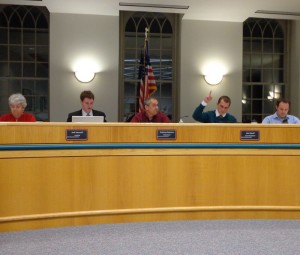Council splits over creation of commission as part of proposed ordinance
By Nate Adams, Correspondent, The Times

Downingtown Borough Council Vice President Alex Rakoff makes a point during discussion over a proposed ordinance banning discrimination, during Wednesday night’s council session.
DOWNINGTOWN — A proposed ordinance aimed at developing a commission to protect borough residents from discrimination sparked debate from council members at Wednesday’s Downingtown Borough Council meeting.
Ordinance 2014-05, which was discussed for potential future adoption by council, calls for a statement of policy and the creation of a human relations commission “to ensure that all individuals, regardless … of race, color, sex, religion … sexual orientation, gender identity or expression … be given equal opportunities for employment, housing and the use of public accommodations.”
The new commission, as outlined in the ordinance, would “promote mutual understanding … make studies to the status of human relations in the borough … [and] act as a referral group for complaints of alleged discrimination and refer complaints to the appropriate social, civic or government agencies for further action.”
According to council Vice President Alex Rakoff, who said the ordinance was developed based off a similar ordinance in Bethlehem, more than 30 municipalities across the state have created such human relations committees.
“There is no specific incident [that inspired this ordinance],” he said. “When is there timing to do the right thing?”
While members of council stated their support for the ordinance in spirit, council members Nick Winkler and Ann Feldman expressed concerns with creating a commission, citing potential future costs to the taxpayers and overreaching powers granted within the ordinance as main points of contention.
“We agree on principle, but we disagree on rolling it out,” Winkler said. “Let’s come up with a mediator or a committee. We’re giving residents a tremendous amount of authority for an issue that isn’t an issue here.”
Feldman questioned the timing of such an ordinance and called it a redundancy.
“I see this as a layer of bureaucracy that could cost the taxpayers more,” she said. “I find the idea of a committee with expanded responsibilities unsettling.”
Mayor Josh Maxwell expressed support for the ordinance, saying that he had spoken to representatives from West Chester and Doylestown where such ordinances have been adopted, and that local support in other municipalities was strong.
“There are people in this community who would be happy to have a resource like this in the area,” he said. “It applies to people in our town who maybe aren’t us.”
Another point of contention on the board was the proposed ordinance’s extension to include residents based on their sexual orientation and gender identity. Currently’ the state’s Human Relations Act does not expand its protection based on sexual identity or orientation. Rakoff said that the ordinance’s expansion was included to offer a resource to residents and to make a statement to state lawmakers that this should be reexamined.
“This is a statement,” he said. “Harrisburg won’t move without change from the ground up. There is no legal protection for LGBT. This can give hope for resources.”
Winkler expressed concerns about creating a group with municipal powers that exist outside the state’s legal purview.
“The problem is the power this gives the commission,” he said. “Why not create a committee for mediation? If we want to talk it out in a good neighbor way, we can do that without all the bureaucracy.”
The council adopted the ordinance for discussion at a future meeting, with members saying they would support an ordinance that made a policy of nondiscrimination for all residents, but that the commission would be addressed and changed before final passage.
The next borough council meeting is scheduled for March 12.






